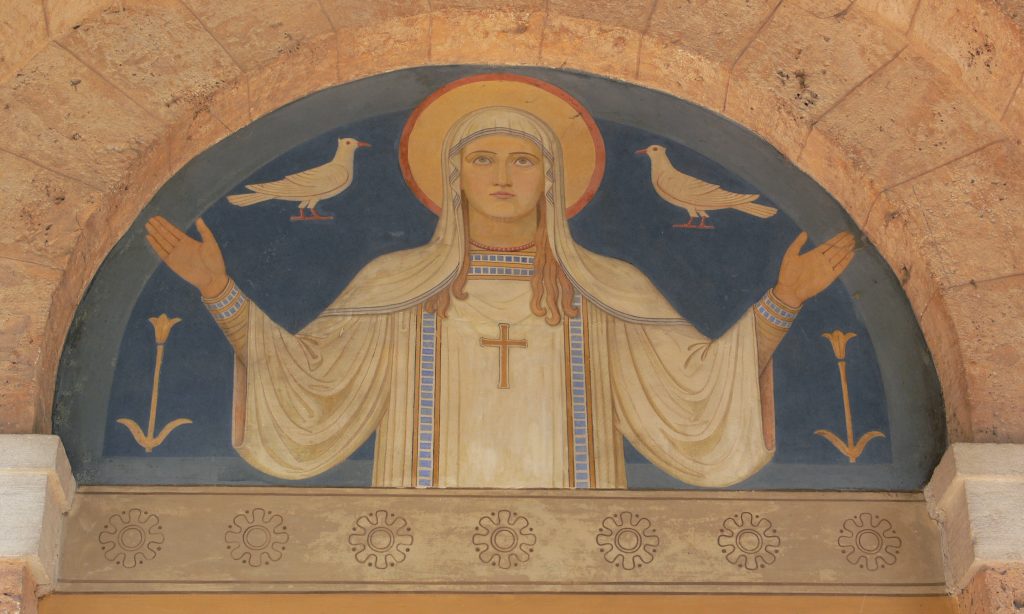Et antequam me invocetis dicam vobis: Ecce adsum (Prologue 3)

3 Jan. 4 May. 3 Sept.
And the Lord, seeking His own workman in the multitude of the people to whom He thus crieth out, saith again: “Who is the man that will have life, and desireth to see good days. And if thou, hearing Him, answer, “I am he,” God saith to thee: “If thou wilt have true and everlasting life, keep thy tongue from evil and thy lips that they speak no guile. Turn from evil, and do good: seek peace and pursue it. And when you have done these things, My eyes will be upon you, and My ears will be open to your prayers; and before you call upon Me, I will say unto you, “Behold, I am here.” What can be sweeter to us, dearest brethren, than this voice of the Lord inviting us? Behold in His loving-kindness the Lord sheweth unto us the way of life.
The Blessed Virgin Mary shows us not only how to listen the Word of God; she also shows us to respond to the Word of God. In all things Our Lady is the Regula Monachorum. Mary, full of grace, held herself in silence and in readiness, eager to receive the revelation of the will of God, poised to obey His bidding.
Behold as the eyes of servants are on the hands of their masters, As the eyes of the handmaid are on the hands of her mistress: so are our eyes unto the Lord our God, until he have mercy on us. (Psalm 122:2)
The psalmist describes the domestic etiquette of antiquity. The master or mistress of the house, especially in the presence of guests, indicated by a discreet hand signal what had to be done. For this reason, the eyes of the servants were, at every moment, fixed on the hands of the master or mistress of the house. Our Lady, the ancilla Domini, the maidservant of the Lord, lived with her eyes fixed on God, ready to obey every indication of His will. There were no shadows in Mary; she placed no conditions on her obedience and no limits on the action of God. The one question Mary asked of the angel models perfectly how Saint Benedict would have a monk respond when commanded to do the impossible (Chapter LXVIII).
Let him receive the orders of him who biddeth him with all mildness and obedience. But if he seeth the weight of the burden altogether to exceed his strength, let him seasonably and with patience lay before his Superior the reasons of his incapacity to obey, without shewing pride, resistance, or contradiction. If, however, after this the Superior still persist in his command, let the younger know that it is expedient for him; and let him obey for the love of God, trusting in His assistance. (Chapter LXVIII)
Look at Mary. She hearkened to the angel’s bidding with all mildness and obedience. She saw that the doing of what was set forth altogether exceeded her capacities. The angel revealed to the Virgin that she would conceive and bring forth a son, and that she would call His name Jesus. This child of hers would be a king, reigning from David’s throne, and ruling over the House of Israel. His reign would be without end, even as the psalmist prophesied in the psalm that we sing at Christmas Matins:
For my hand shall help him: and my arm shall strengthen him. The enemy shall have no advantage over him: nor the son of iniquity have power to hurt him. And I will cut down his enemies before his face; and them that hate him I will put to flight. And my truth and my mercy shall be with him: and in my name shall his horn be exalted. And I will set his hand in the sea; and his right hand in the rivers. He shall cry out to me: Thou art my father: my God, and the support of my salvation. And I will make him my firstborn, high above the kings of the earth. I will keep my mercy for him for ever: and my covenant faithful to him. And I will make his seed to endure for evermore: and his throne as the days of heaven. (Psalm 88:22–30)
Humbly, the Virgin laid before the angel the reasons of her incapacity, not refusing to obey, but simply stating that what was being asked to her appeared impossible: “And Mary said to the angel: How shall this be done, because I know not man?” In this answer of hers, there is not a trace of pride, resistance, or contradiction. The immensity of the divine plan, thus revealed to the Virgin, would have provoked suspicion, hesitation, and even scorn in one less humble, less little than she was, but because Mary was so little, so utterly without guile, she gave her assent freely and confidently, certain that God would do just as He said. In a responsory of the Office of Our Lady we hear her sing:
Rejoice with me, all ye that love the Lord, for being little I pleased the Most Highest; and I brought forth Him who is God and Man.
Once the angel had responded to her question, Mary was quick to assent to all that was asked of her:
The Holy Ghost shall come upon thee, and the power of the most High shall overshadow thee. And therefore also the Holy which shall be born of thee shall be called the Son of God. And behold thy cousin Elizabeth, she also hath conceived a son in her old age; and this is the sixth month with her that is called barren: Because no word shall be impossible with God. And Mary said: Behold the handmaid of the Lord; be it done to me according to thy word. And the angel departed from her.(Luke 1:35–38)
The connection between the Annunciation of the Blessed Virgin Mary and today’s appointed passage from the Prologue of the Holy Rule is, I think, clear enough. For Saint Benedict, the life of a monk begins with a kind of annunciation:
And the Lord, seeking His own workman in the multitude of the people to whom He thus crieth out, saith again: “Who is the man that will have life, and desireth to see good days”.
It is a man’s first response, the original assent — “I am he” — that, like the Ecce ancilla Domini of the Virgin, sets in motion a lifelong series of annunciations. The terms of this original assent are spelled out:
And if thou, hearing Him, answer, “I am he,” God saith to thee: “If thou wilt have true and everlasting life, keep thy tongue from evil and thy lips that they speak no guile. Turn from evil, and do good: seek peace and pursue it.
The terms are simple enough. They describe in a programmatic way the whole life of a monk: the desire for heaven; the turning away from sin; the doing of what is good; the lifelong seeking after and pursuit of peace. To the man who responds to this annunciation as the Virgin of Nazareth did to hers, God promises this:
And when you have done these things, My eyes will be upon you, and My ears will be open to your prayers; and before you call upon Me, I will say unto you, “Behold, I am here.”
In these words, we are given the description of the interior life of the monk: he lives as a child under the gaze of God, knowing that the divine gaze envelops him, even as it enveloped the Beloved Son at His Baptism in the Jordan and on the heights of Mount Thabor. The monk, growing into his Baptismal identity, is, by grace, what Jesus is by nature. He is confident that the ears of God are open to his prayers, because every prayer of his is uttered per Christum. There is no need to capture God’s attention or to win a hearing with Him. One who lives in Christ prays always in what Blessed Marmion calls the sanctuarium exauditionis, the sanctuary wherein no prayer goes unheard. God is, at every moment, attentive to the monk, even before he opens his mouth to pray. One who lives in the grace of divine sonship knows, in faith, that God precedes his poor prayer, and makes it possible by His prevenient grace:
Before you call upon Me, I will say unto you, “Behold, I am here”.

